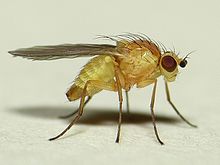Phytomyza ranunculi
| Phytomyza ranunculi | |
|---|---|

| |
| Phytomyza ranunculi Netherlands | |
| Scientific classification | |
| Domain: | Eukaryota |
| Kingdom: | Animalia |
| Phylum: | Arthropoda |
| Class: | Insecta |
| Order: | Diptera |
| Family: | Agromyzidae |
| Subfamily: | Phytomyzinae |
| Genus: | Phytomyza |
| Species: | P. ranunculi
|
| Binomial name | |
| Phytomyza ranunculi | |
| Synonyms | |
| |
Phytomyza ranunculi is a species of fly in the family Agromyzidae. It is found in the Palearctic .[14][15][16]
Life cycle
[edit]
Eggs are laid on plants in the Ranunculaceae family. The larvae are, primarily, leaf-miners. They form a long, conspicuous white mine with the frass present in close strings.[17]
In 2018 the first confirmed adults were reared from stem-mines of meadow buttercup (Ranunculus acris). This is a rare example of 'organoxeny', where a phytophagous insect occurs on a different part of a plant from where it can normally be found .[18]
The larvae pupates into a greyish or brown puparium, with posterior spiracles each with about 18-20 bulbs.[17] Adult flies are approximately 2 mm in length. Adults are highly variable in colour, with several named variants including a pale form (P. ranunculi var. flava) and dark forms (P. ranunculi var. flavoscutellata and var. islandica).[18]
Distribution
[edit]The fly is widespread throughout Europe.[17]
Parasitoids
[edit]P. ranunculi pupae are particularly at risk from parasitism. Up to 75% of all reared puparium have been shown to be parasitised.[18] Parasitoids of this species include numerous species in the hymenoptera superfamilies Chalcidoidea and Ichneumonoidea:[17]
- Chrysocharis idyia (Walker, 1839)
- Chrysocharis orbicularis (Nees, 1834)
- Chrysocharis pentheus (Walker, 1839)
- Chrysocharis pubicornis (Zetterstedt, 1838)
- Chrysocharis viridis (Nees, 1934)
- Pediobius metallicus (Nees, 1834)
- Cirrospilus vittatus Walker, 1838
- Diglyphus chabrias (Walker, 1838)
- Diglyphus isaea (Walker, 1838)
- Diglyphus minoeus (Walker, 1838)
- Diglyphus pusztensis (Erdös and Novicky, 1951)
- Hemiptarsenus ornatus (Nees, 1834)
- Hemiptarsenus unguicellus (Zetterstedt, 1838)
- Necremnus tidius (Walker, 1839)
- Pnigalio soemius (Walker, 1839)
- Miscogaster elegans Walker, 1833
- Miscogaster maculata Walker, 1833
- Stenomalina gracilis (Walker, 1934)
- Epiclerus panyas (Walker, 1839)
- Chorebus kama (Nixon, 1945)
- Coloneura stylata Förster, 1862
- Dacnusa areolaris (Nees, 1811)
- Dacnusa confinis Ruthe, 1859
- Dacnusa laeta (Nixon, 1954)
- Dacnusa laevipectus Thomson, 1895
- Dacnusa macrospila (Haliday, 1839)
- Dacnusa maculipes Thomson, 1895
- Dacnusa melicerta (Nixon, 1954)
- Dacnusa sibirica Telenga, 1935
- Dapsilarthra sylvia (Haliday, 1839)
- Exotela gilvipes (Haliday, 1839)
- Grammospila rufiventris (Nees, 1812)
- Colastes braconius Haliday, 1833
- Apodesmia posticatae (Fischer, 1957)
- Opius pallipes Wesmael, 1835
- Opius orbiculator (Nees, 1811)
References
[edit]- ^ a b Schrank, F. von Paula (1803). Favna Boica. Durchgedachte Geschichte der in Baiern einheimischen und zahmen Thiere. Vol. 3,. Landshut: Krull. pp. Pt. 1. viii + 372 pp.
- ^ a b c d e f Meigen, J. W. (1830). Systematische Beschreibung der bekannten europäischen zweiflügeligen Insekten. (Volume 6) (PDF) (in German). Schulz-Wundermann. Archived from the original (PDF) on 2012-02-09.
- ^ a b Zetterstedt, J.W. (1848). Diptera Scandinaviae disposita et descipta. Tomus septimus. Lundae [= Lund.].: Officina Lundbergiana. pp. 2581–2934.
- ^ Roser, K.L.F. von (1840). "Erster Nachtrag zu dem im Jahre 1834 bekannt gemachten Verzeichnisse in Wurttemberg vorkommender zweiflugliger Insekten". Correspondenzbl. K. Wurttemb. Landw. Ver., Stuttgart. 37 [=N.S. 17] (1): 49–64.
- ^ a b Fallén, C.F. (1823). Phytomyzides et Ochtidiae Sveciae. Lundae [= Lund]: Berlingianis. pp. 10 pp.
- ^ Fallen, C.F. (1810). Specim. entomolog. novam Diptera disponendi methodum exhibens. Lund: Berlingianis. pp. 26 pp., 1 pl. Retrieved 10 January 2022.
- ^ Strobl, P.G. (1902). "Novi prilozi fauni diptera Balkans'kog poluostrva[New contributions to the dipterous fauna of the Balkan peninsula]". Glas. Zemalj. Mus. Bosni Hercegov. 14: 461–517.
- ^ Macquart, P.J.M. (1835). Histoire Naturelle des insectes. Diptères. Tome deuxieme. Paris: Roret. pp. 703 or 710 pp., 12 pls. Retrieved 27 January 2021.
- ^ Lundqvist, A. (1947). "Agromyzider från Södermandland". Opuscula Entomologica. 12: 61–76.
- ^ Brullé, A.M. (1833). IVe Classe. Insectes [part], pp. 289-336. In; Bory de Saint-Vincent (ed.), Expedition scientifique de Moree. Section des sciences physiques 3 (1) (Zool. 2). Paris. pp. 400 pp.
- ^ a b Robineau-Desvoidy, J.B. (1851). "Description d'agromyzes et de phytomyzes ecloses chez M. le colonel Goureau". Revue Mag. Zool. 3 (2): 391–405.
- ^ Kaltenbach, J.H. (1867). "Die deutschen Phytophagen aus der Klasse der Insekten [cont.]". Verh. Naturh. Ver. Preuss. Rheinl. 24 (3–4): 21–117.
- ^ Schiner, I.R. (1862). "Fauna Austriaca". Theil II. Heft. 9/10: 81–288.
- ^ Fauna Europaea
- ^ Bei-Bienko, G.Y. & Steyskal, G.C. (1988) Keys to the Insects of the European Part of the USSR, Volume V: Diptera and Siphonaptera, Parts I, II. Amerind Publishing Co., New Delhi.ISBN 81-205-0080-6 ISBN 81-205-0081-4
- ^ Séguy, E. (1934) Diptères: Brachycères. II. Muscidae acalypterae, Scatophagidae. Paris: Éditions Faune de France 28 Bibliotheque Virtuelle Numerique pdf
- ^ a b c d "Phytomyza ranunculi (Schrank, 1803) [Diptera: Agromyzidae]". UK Fly Mines. Retrieved 1 February 2020.
- ^ a b c Warrington, Barry P. (2019). "Organoxeny within Phytomyza ranunculi (Schrank) (Diptera, Agromyzidae) larvae". Dipterists Digest. 26: 5–12.
